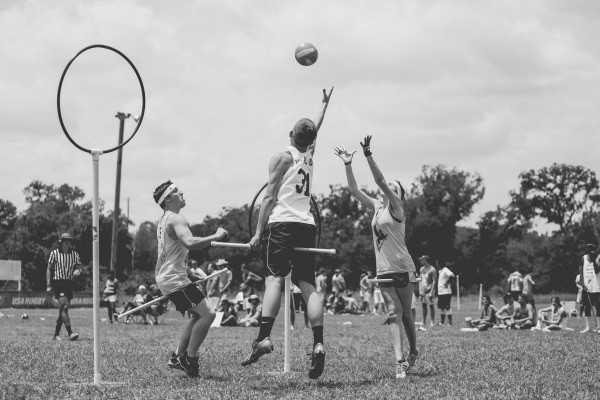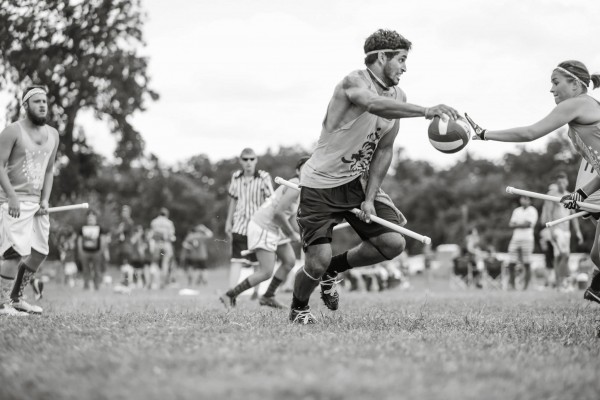- Rule, Britannia, no more?
- Unpopular Opinions: US Quadball Cup 2023
- Proven Contenders: University of Virginia
- Proven Contenders: Rutgers University
- Proven Contenders: University of Michigan
- Proven Contenders: Creighton University
- Different Perspectives: A Look Inside USA Ultimate
- Antwerp QC, Much of Belgian Core, Leaves Competitive Quidditch
THE Fantasy Recap
- Updated: August 19, 2014

Credit: Lauren Claire Photography
The premiere tournament of the summer, THE Fantasy Tournament, took place August 2 in Austin, Texas. Gotham Rogue’s beater Tad Walters put together a short recap of each team’s performance for your reading pleasure.
The Silver Bullets (Grey) Many people (myself included) predicted that the Silver Bullets would have trouble clicking and generating chemistry as easily as the other teams. Those people were correct. The Silver Bullets struggled to compete with other teams, even though it was argued to be one of the most talented. Numerous cards and frustrations were ultimately the downfall of the Silver Bullets, despite great showings from the starting line including Audrey Wright (University of Texas [UT]), Kifer Gregoire (Texas A&M University) and Mathieu Gregoire (Lone Star Quidditch Club [LSQC]).
Austin Elite (Green) I’m a little bitter considering this team eliminated mine from the tournament in the Final Four. At first, it seemed this team’s fatal flaw was their beaters; however, Samy Mousa (University of Kansas [KU]) and Carlos Elarba (Sam Houston State University [SHSU]) stepped up and did what they needed to do for their team to succeed. Harry Greenhouse (University of Maryland) proved he was worth 260 galleons, with huge plays on offense and defense. But the most impressive part of this team was that every player contributed. There was no player who watched from the sidelines the entire time; everyone was involved and it worked for them up until they were outmatched in the finals by Star Spangled Hammered.
Gotham Rogues (Black) I may be biased when I say this team was the Cinderella story of the tournament, but this team made a deep run, only losing by snitch catch to Alex Wilson’s Austin Elite. Despite having no big-name ball carriers, they needed players like Paden Pace (UT), Cole Travis (Louisiana State University [LSU]) Justin Dugie (University of Houston[UH]), Jordan Key (University of Arkansas) and Justin Lopez (Texas State University) to step up, and that is exactly what they did. Paired with the aggressive Freddy Salinas (UT)/Tad Walters (Loyola University New Orleans) beater combination and Amanda “Turtles” Nagy (formerly Lost Boys), this team’s beating helped them stay in snitch range so that seeker Margo Aleman (formerly UT) could win the SWIM, which happened three out of four times.
Star Spangled Hammered (Royal Blue) MPV Stevie Bell (LSQC) was not the biggest story for this team, nor was teammates Aryan Ghoddossy (UT) or Kody Marshall (LSQC). Star Spangled Hammered was proof that cheap players are not always bad picks. Hope Machala (LSQC) did an excellent job of drafting many unknown players who ended up helping this team to a championship. Austin Lillis (Tennessee Tech University) had a standout game in the finals and did well the entire tournament. Whether it was the hits by Austin Pitts (Crimson Warhawks) and Dilan Freeman (UH) or the offensive power of Heather Burg (University of Southern Mississippi [USM]), Sam Reagan (SHSU) and Jonathon Ruland (LSQC), this team proved it was the best at the tournament by taking the second-place team out of snitch range.
Vicious and Delicious (Maroon) This team’s poor performance at the tournament was a bit of a surprise. Even with studs like Kenny Chilton (UT) and Savannah Allison (Texas A&M), this team struggled to stick with the more complete teams at the tournament. Veterans Jacob Adlis (formerly UT) and Paul Williard (Baylor University) both showed they were still relevant in the game but were definitely rusty. While both of them contributed alongside the likes of Noah Schwartz (Tufts University), this team did not have enough depth to hang, despite stellar performances from the big names.
The Grapes of Wrath (Purple) This team was one of the favorites to win with the fearsome beater duo of Chris Seto (Lost Boys) and Mollie Lensing (LSQC) leading the charge. However, this team took time to acclimate to each other—Seto and Lensing obviously more accustomed to playing in different systems. But Chris Morris (LSQC) and Chris Scholz (LSQC) spent the whole day making huge plays on offense and defense, with support from Steven Gergen (Loyola-NO), as well as Nash Mock (formerly LSQC), a player picked up in the supplemental draft. They found their groove later on in the tournament and were able to contend with the top teams, falling just short to the Mane Event on Sunday morning.
The Eagles (Light Blue) This team’s relative success came on the backs of star players Drew “Drewski” Wasikowski (formerly A&M), Ryan Davis (UT) and Chris Rhodes (Baylor University). This trifecta was the Eagles’ defense and the Drewski/Davis combo essentially was the Eagles’ offense, which is why this team struggled on day two without Wasikowski. Beaters Rhodes and Reed Duncan (formerly LSQC)—a formidable 1-2 combo—did not necessarily have bludger control but were able to take beaters out on offense, clearing lanes for Davis and Wasikowski. Like other teams at this tournament, the depth was not present, and it hurt the team in the long run.
Oranje Krush Quidditch Club (Orange) This team was held together by Simon Arends (LSQC), Sarah Holub (LSQC) and Marty Bermudez (UT). They scored a large majority of the points on offense but were overworked on defense. Their beaters struggled to maintain control throughout the whole tournament, and even when they had control, were not as effective as they should have been. Kiki Crawford (UT) and Sarah Kneiling (formerly LSU) did not get as much playing time together as they should have, which killed this team throughout the tournament.

Credit: Lauren Claire Photography
American Outlaws (Red) One surprise to come out of this team was the deep male beater line. I knew of the individual skill of Trevor Campbell (Ball State University), Kyle Carpenter (USM) and Josh Carroll (Texas Tech), but I could not have imagined how well they would handle the competition. Campbell proved he can hang with the best of the Southwest, and Carpenter proved that he is not only a good snitch, he can kill it as beater as well. These beaters, paired up with Baylor’s Brittany Ripperger and Hannah Johns, made them arguably the deepest beater set of the tournament. And with experienced chasers like Tyrell Williams (Texas State), Kaci Erwin (UT), Trent Miller (Baylor) and Clay Enderlin (Texas A&M), this team falling in the quarterfinals was a surprise.
The Mane Event (Brown) Another semifinalist, the Mane Event gave the eventual champions the best game of the tournament. Running a two-male beater set, they utilized Michael Gallaty (Loyola-NO), Ben Reuling (Utah Crimson Fliers) and Evan Carr (formerly UT) to have one of the most dominant beater games of the tournament. Their conservative play style, paired with excellent blocks from keepers Augustine Monroe (UT) and Josh Tates (unaffiliated), made them hard to score against. On offense, Monroe led the charge along with Missy Sponagle (Lost Boys) and Hank Dugie (UH). The team also featured contributions from an excellent supporting cast in Tye Rush (University of California, Riverside), Jaycob Freeman (UH), Heather Bennett (LSU) and Jessica Banaszak (Ball State). The big story of this team, though, was newcomer Tates, who not only played keeper but made a couple of clutch catches at seeker to give his team some wins.
Turn Down for White (White) While managing to go undefeated on the first day, Turn Down for White struggled on day two with the unexpected absence of Texas A&M beater Sean Fry. However, this allowed Colin Capello (formerly UT) to step into the familiar role of beater when his team needed control. This team had a pile of talent, with Adam Heald of KU making big plays on both sides of the ball, as well as Ian Strickland (Tribe Quidditch) and Justin Peters (Tribe) of #peterland filling whatever roles were necessary. With names like Elias Kellogg (Oklahoma State University [OSU]), Oscar Hernandez (Tribe), Alyssa York (Texas A&M) and Capello at chaser, this team’s only weakness was their beater game, which, inevitably, is what cost them their quarterfinal game to the Gotham Rogues.
Greek Fire (Lime Green) The stars of this team were definitely Rosemary Ross (Texas A&M) and Michael Mohlman (Lost Boys), who played lights out trying to keep their team afloat. While they had some big names at chaser with Eric Reyes (Texas State), Mark Williard (Baylor), Devon McCoy (Blue Mountain Quidditch Club) and the relatively unknown Eric Williams (Crimson Fliers), this team had a problem staying in snitch range. This caused Texas State seeker Steven Gralinski to play defensive seeker for the majority of the tournament. The out-of-region talent on this team was impressive. Williams, McCoy and Mohlman all contributed heavily to the relative success of their team.
Captain Jack’s Royal Navy (Navy Blue) How this team did not win is a mystery. On paper, they had the best 1-2 beater combo in the tournament, with David Gilbert (Baylor) and Ryan Peavler (Texas State). They had great quaffle players like Craig Garrison (LSQC) and Alex Browne (Lost Boys), and almost the entire team contributed regularly on offense and defense. Their seeker line-up of Bryan Stevenson (University of Texas at San Antonio), Taylor Risinger (Austin Quidditch) and Craig Garrison (LSQC) was terrifying and resulted in multiple catches on the first day. However, their luck changed on day two, and it was a shame to see this team knocked out so early.
Pink Pegasi (Pink) This team had good players at every position, they just had a problem putting it all together. At beater, Jacob Wilson (LSQC) and Ruben Polanco (formerly A&M) worked well with Beth Clementi (Texas State) but struggled in some games to maintain control. In the chaser game, Rich Kemp (Texas State), Kat Stewart (Arkansas) and Hayden Applebee (OSU) carried, with contributions from Tiffany Chow (Lost Boys), Romie Lof (Texas State) and Daniel Bellini (Austin Quidditch). The real standout here was OSU’s Applebee, with big plays on both sides of the ball. His hard hits and logical play make him a player to look out for in the future.
Players you didn’t know, but you probably should (no particular order):
Hayden Applebee, Pink Pegasi, Oklahoma State University
Eli Suarez, Captain Jack’s Royal Navy, University of Texas at San Antonio
Oscar Hernandez, Turn Down for White, Tribe Quidditch
Elias Kellogg, Turn Down for White, Oklahoma State University
Jaycob Freeman, The Mane Event, University of Houston
Josh Tates, The Mane Event, Unaffiliated
Jonathon Ruland, Star Spangled Hammered, Lone Star Quidditch Club
Austin Lillis, Star Spangled Hammered, Tennessee Tech University
Dillan Freeman, Star Spangled Hammered, University of Houston
Austin Pitts, Star Spangled Hammered, Crimson Warhawks
Justin Dugie, Gotham Rogues, University of Houston
Cole Travis, Gotham Rogues, Louisiana State University
Josh Ebbesmeyer, Austin Elite, University of Missouri
Kat Stewart, Pink Pegasi, University of Arkansas
Jessica Banaszak, The Mane Event, Ball State University
Stephen Bell contributed to this article.

One Comment